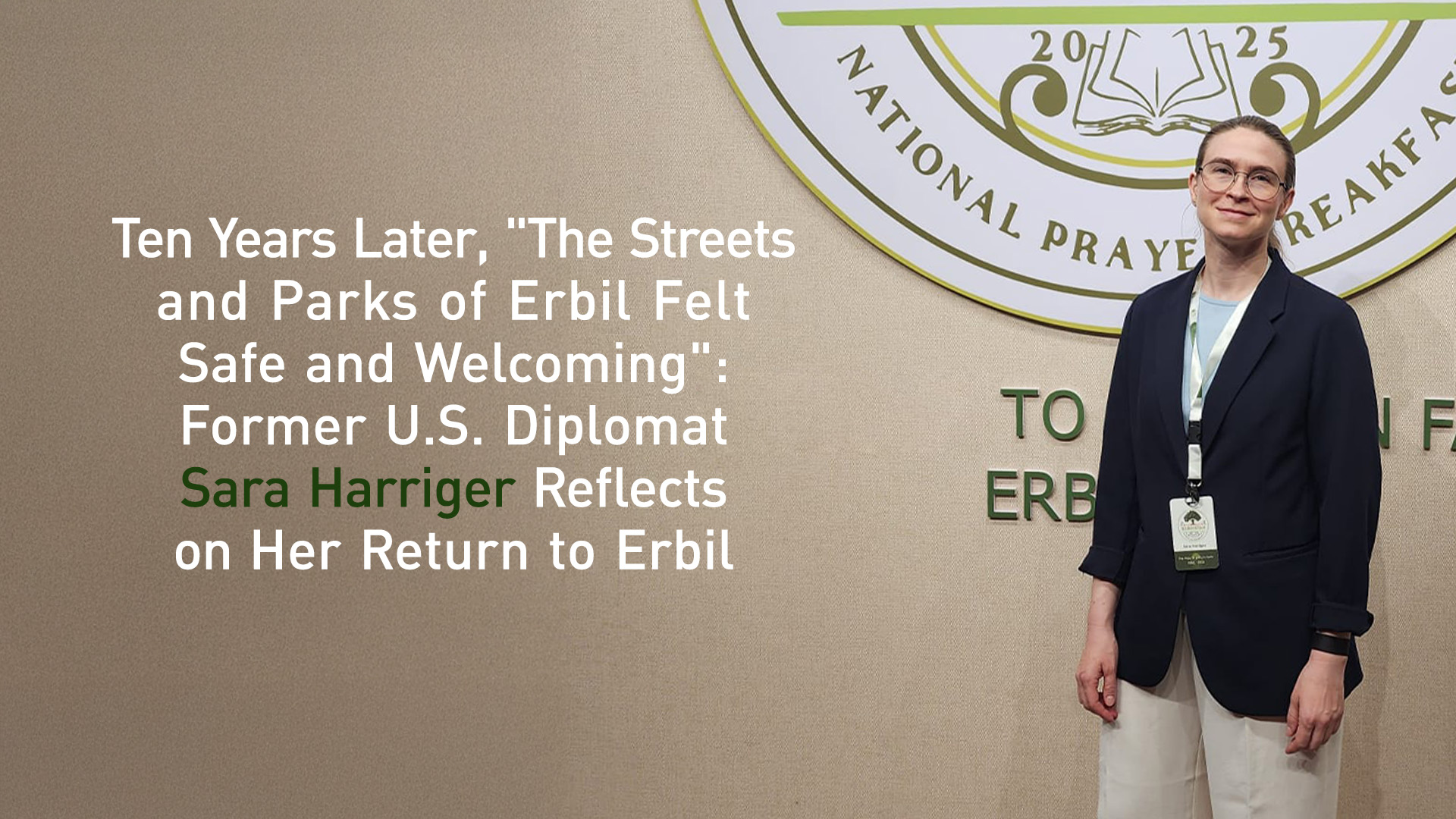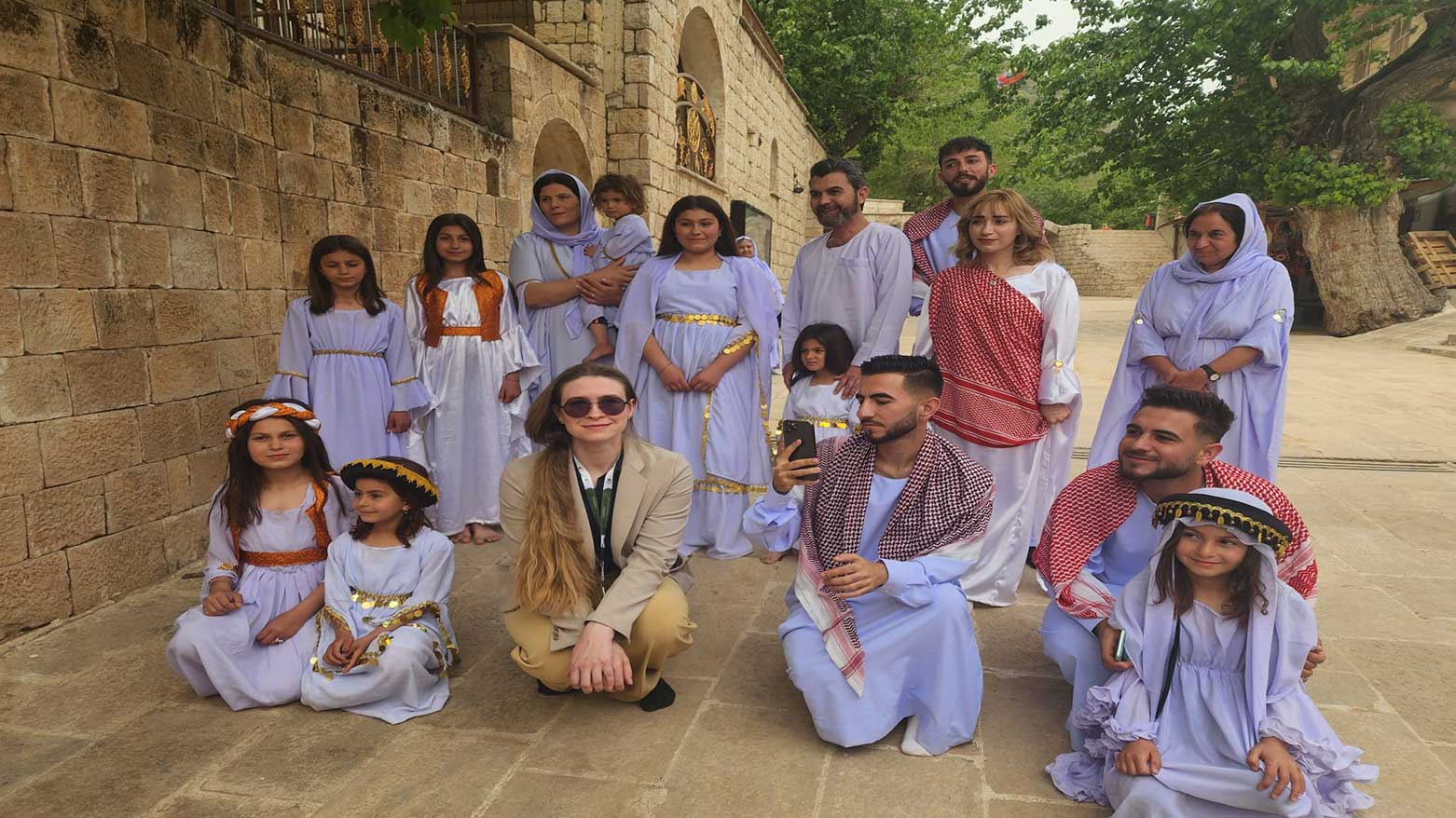Ten Years Later, "The Streets and Parks of Erbil Felt Safe and Welcoming": Former U.S. Diplomat Sara Harriger Reflects on Her Return to Erbil

ERBIL (Kurdistan24) — Sara Harriger, a former U.S. Public Affairs Officer at the U.S. Consulate General in Erbil during the height of the ISIS crisis in 2014–2015, has returned to the Kurdistan Region after ten years and shared with Kurdistan24 English her deeply personal impressions of the region’s transformation, its resilience, and its continued potential for growth.
Now, Vice President at the Maureen and Mike Mansfield Foundation, Harriger was visibly moved during her recent visit to Erbil. “It felt peaceful, thriving, and welcoming—so different from the high-security environment we had to operate in when ISIS was just kilometers away,” she said. “To walk freely in Erbil, dine at StreetSide restaurants, and enjoy tea at the foot of the Citadel with local friends—it was something I never got to do before. This time, it felt like a homecoming.”
A Region Transformed
Harriger noted substantial changes in infrastructure, urban development, and public life since her last tenure. "Erbil has grown significantly, and I was fascinated to hear how the local government is navigating challenges like population increase, water management, and electricity distribution," she said. She also praised the restoration work done on key historical sites like the Erbil Citadel and its ancient hammam, a project she had once helped support during her diplomatic service.
She emphasized the importance of cultural heritage: “Hearing that the State Department has continued to fund projects in Kurdistan was music to my ears. I believe strongly in the power of cultural preservation as a foundation for peace and identity.”
Reflections on a Career-Shaping Posting
During her time in Erbil, Harriger led initiatives focused on youth engagement and cultural diplomacy. One such initiative was the “Embassy Academy,” a program connecting U.S. diplomats with Kurdish university students. “Working with those students was inspiring—they’ve gone on to become diplomats, doctors, and leaders. It gave me real hope for the future of this region.”
She also recalled organizing an alumni reunion at the Erbil Citadel for State Department exchange program graduates. “Despite security constraints, we brought together about 80 alumni to share a meal and music under the stars. It was a powerful moment of unity and vision.”
A Bridge Between Peoples
During her visit, Harriger participated in the First Kurdistan National Prayer Breakfast Day, a landmark interfaith gathering inspired by the U.S. National Prayer Breakfast. “I was impressed by the quality of organization and the broad support it received from government and religious communities alike,” she said. “Events like this are strategic—they create meaningful connections between Kurdistan and the world, particularly around shared values like religious freedom.”
She emphasized that such people-to-people engagements are critical in diplomacy: “This event showed visitors—many of whom were here for the first time—that Kurdistan is safe, diverse, and ready to engage with the global community.”
A Message to Kurdistan’s Youth
Harriger’s message to the younger generation of Kurdistan was clear: seek new perspectives. “I grew up in rural Alaska and didn’t understand how special my home was until I studied abroad. Young Kurds should take every opportunity to connect with the world—to travel, study, or even just engage with foreigners here. That outside view helps you see the value of your own culture and find ways to strengthen it.”
Looking Ahead
Asked if she would return, Harriger was unequivocal. “Absolutely. I’d love to revisit the universities, explore more of the archaeological sites, and even hike the Zagros trail. One day, I hope to bring my son here and introduce him to this incredible place and the friends who made it so memorable.”
Her visit, filled with nostalgia, admiration, and encouragement, highlighted just how far the Kurdistan Region has come—and how much potential still lies ahead.
Full Transcript of the Interview:
Q1: How does it feel to return to the Kurdistan Region after ten years?
A: I feel very fortunate and honored to have had this opportunity. We were last here in 2014-2015, when the situation in the region was quite dangerous. ISIS was just kilometers away from Erbil, and the areas we were able to visit on this trip were being heavily defended by Peshmerga. The coalition was conducting airstrikes. As US diplomats, we were under heavy security restrictions and had to be extremely careful. Returning now, I was moved to see local friends and colleagues from back then in the context of a peaceful and growing region, and to be able to enjoy the city freely with them and to go to their homes to share a meal like family. The streets and parks of Erbil felt safe and welcoming, and I was glad to see my colleagues’ families happy and thriving. We were able to share a meal at a street-side restaurant and have tea at the café by the citadel walls that I had always seen in pictures and videos, but never visited.
Q2: What are some of the most noticeable changes you have observed in the Kurdistan Region since your last time here?
A: I noticed that Erbil seems to have grown and developed quite a lot. I was interested to learn more about how the local government is planning for such growth, not only in terms of social issues like the ones we discussed at the event, but also in terms of water management, power generation, and distribution etc. I was interested to learn that the population has grown significantly, with many IDPs settling here and a continued inflow of people from other parts of Iraq.
Although I couldn’t see it with my own eyes on this trip, I understand that some important archeological restoration has been accomplished, including with support from the State Department, around the historically rich Kurdistan Region. I loved working on projects to support archeological discovery and preservation when I was posted to Erbil, so, for example, hearing that the State Department has funded important renovations and developments at the Citadel was music to my ears. I heard that the Citadel’s hammam has been restored, for example!
Q3: Could you share a few memories from your time working at the American Consulate in Erbil?
A: I supported several officials, including the Ambassador, on visits to IDP camps. Speaking to people there and learning just how quickly and dramatically their lives had been transformed is a memory that has stuck with me. I would like to know more about how the people, especially the children, I met in the IDP camps are doing today.
On a more cheerful note, I had a pet project working with small groups of local university students. It was called “Embassy Academy.” I was very proud of those students and their enthusiastic contributions to discussions with American diplomats on topics related to diplomacy, history, cross-cultural communication, and so much more. I learned a lot about the young generation of the Kurdistan Region by working with them. Many of those young people have gone on to great careers, for example in diplomacy and medicine.
Finally, although we were under such tight security, my team and I somehow managed to get local and Embassy approval to host an event for State Department exchange alumni from programs like Fulbright and IVLP at the citadel. The memory of probably 80 like-minded alumni gathering in the citadel to share a meal, music, and their visions for the future was a highlight of my time in Erbil. I believe deeply in the power of people-to-people exchanges to build lasting networks and make positive change in the world.
Q4: You attended the First Kurdistan National Prayer Breakfast Day. What are your impressions of the event?
A: I understand the event was inspired by the prayer breakfast that took place in Washington, DC, in January, and I was impressed by the planning and execution that was completed in such a short time. The planning partners and protocol team did a fabulous job, and it was clear that the event had strong support from the government and the religious communities. Every guest I spoke to left with new connections, new knowledge of the region, and a positive impression. The prayer breakfast is a good example of the power of people-to-people exchange, and I believe it will create important connections between the people of the Kurdistan Region and other countries.
Q5: In your view, how important are gatherings like the Prayer Breakfast for promoting unity, dialogue, and understanding in Kurdistan and strengthening relationships between Kurdistan and the international community?
A: As I mentioned, I think people-to-people exchange can make lasting, positive change. The first Kurdistan National Prayer Breakfast, I think, opened many participants’ eyes to this region. It was the first time for many of the guests to travel here, and thanks to the event, they could see that the region is safe and welcoming, and supportive of religious freedom. It was good to see many European parliamentarians as well as representatives from the US Department of State at the event. I think it is strategic on the part of Kurdistan to build relationships with the international community, including on topics like religious freedom, at multiple levels. In that light, I think this was a very important event, and I look forward to seeing the results it produces over time.
Q6: What message would you like to share with the people of the Kurdistan Region, especially the younger generation, as they continue to build their future?
A: I have learned so much from living, studying, and working in different places over the course of my life. I’m originally from Alaska, a very rural and remote part of the United States. I think I didn’t truly understand how special the place I grew up in is until I left for a study abroad program as a teenager. So, one message I would have is to encourage young people in the Kurdistan Region to try to understand the place they come from more deeply by gaining an outside perspective. If youth have a chance to study abroad or make friends with someone who has come here from another place, I encourage them to do so. Sharing information about where you come from with people who have never been there, and seeing your own society through a new lens, lets you understand what is unique and special about it, and helps you spot opportunities to help your community. It can be inspiring and motivating, and I know the people of the Kurdistan Region - especially the youth - have the energy and talent to put that inspiration to work.
Q7: Would you consider returning again or even contributing in some way to the development of the Kurdistan Region in the future?
A: Yes, I would love to return to this event in future years and find more ways to stay engaged with the Kurdistan Region in the future. I would love to explore more of the historic and archaeological sites; I’m interested in the Zagros hiking trail; and I’d also like to learn more about traditional agriculture in the region. If I had enough time, I’d really love to go see some of the universities I used to work with and see how the programs there have evolved. I hope to come back one day with my son, who is 8 now, to show him the historic sites and introduce him to the friends here who haven’t yet made it to the US to visit. On such a short trip, I was only able to scratch the surface of all the changes that have taken place and the opportunities ahead.

